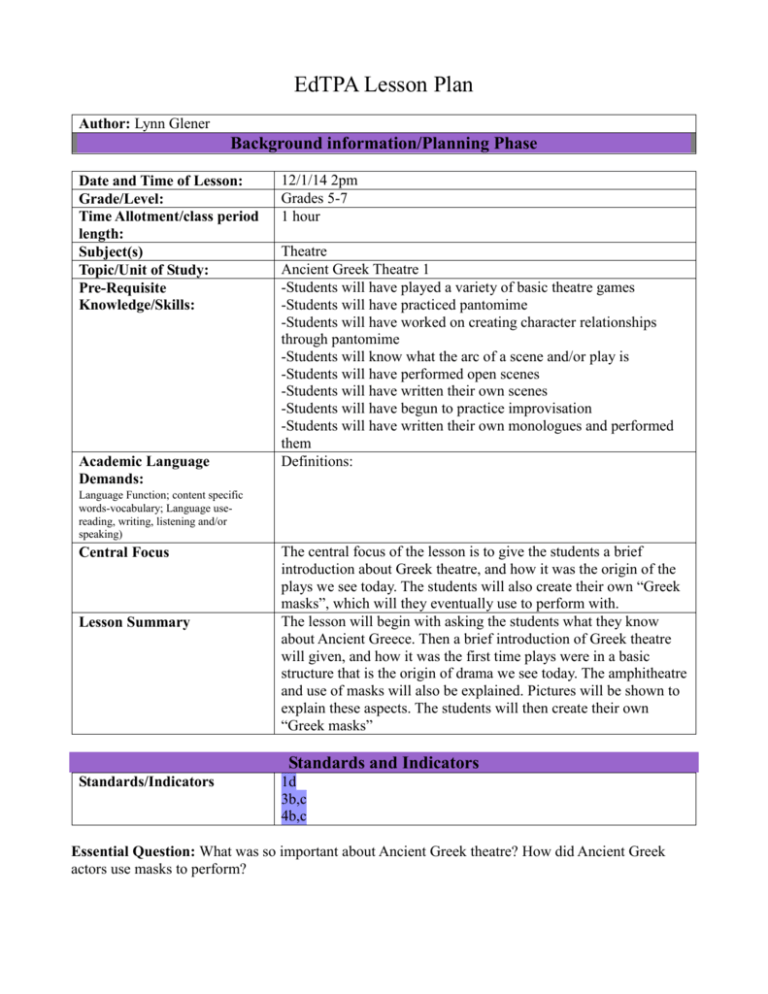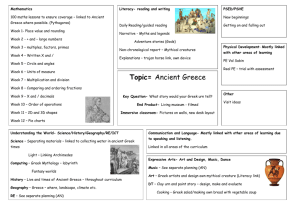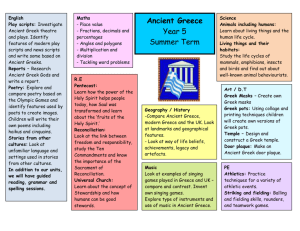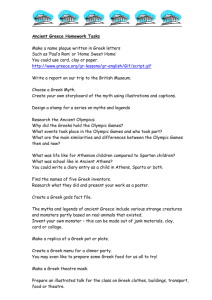File
advertisement

EdTPA Lesson Plan Author: Lynn Glener Background information/Planning Phase Date and Time of Lesson: Grade/Level: Time Allotment/class period length: Subject(s) Topic/Unit of Study: Pre-Requisite Knowledge/Skills: Academic Language Demands: 12/1/14 2pm Grades 5-7 1 hour Theatre Ancient Greek Theatre 1 -Students will have played a variety of basic theatre games -Students will have practiced pantomime -Students will have worked on creating character relationships through pantomime -Students will know what the arc of a scene and/or play is -Students will have performed open scenes -Students will have written their own scenes -Students will have begun to practice improvisation -Students will have written their own monologues and performed them Definitions: Language Function; content specific words-vocabulary; Language usereading, writing, listening and/or speaking) Central Focus Lesson Summary The central focus of the lesson is to give the students a brief introduction about Greek theatre, and how it was the origin of the plays we see today. The students will also create their own “Greek masks”, which will they eventually use to perform with. The lesson will begin with asking the students what they know about Ancient Greece. Then a brief introduction of Greek theatre will given, and how it was the first time plays were in a basic structure that is the origin of drama we see today. The amphitheatre and use of masks will also be explained. Pictures will be shown to explain these aspects. The students will then create their own “Greek masks” Standards and Indicators Standards/Indicators 1d 3b,c 4b,c Essential Question: What was so important about Ancient Greek theatre? How did Ancient Greek actors use masks to perform? Learning Objectives: The students will be able to: - Identify aspects of Ancient Greek theatre - Understand how Ancient Greek theatre influenced the future of drama - Recognize how actors used masks in Ancient Greek theatre Anticipatory Set: The lesson will begin with asking the students what they know about Ancient Greece as a discussion. Procedure: 1. The anticipatory set will begin the lesson. 2. The teacher will tell the students that Ancient Greece is the origin of drama as we know it today, if it was not already mentioned. A brief history will be explained of how it originated with the playwriting competition at the Dionysian festival and Thespis, the first called playwright, who won the first competition. That is why actors are sometimes called thespians. 3. The general structure of Greek plays will be explained: - Prologue: the exposition - Parados: entrance of the chorus - Episodes: an action relating to the plot, and chorus commenting on it (repeats a few times) - Exodus: the exit 4. There will then be an explanation of the amphitheatre and how the actors performed on them, including the use of masks. 5. After that explanation, the teacher will lead an activity where the students will create their own Greek masks out of manila folders. Closure Activity: If time permits, there will be a brief group reflection on the activity and how their masks can be used in a Greek play. Extension Activities: (if applicable) Instructional Materials, Resources and Planned Supports Instructional Materials (handouts, etc.) Resources Technology Other planned support Pictures of certain aspects of the lesson (a Greek mask, an amphitheatre, etc.); manila folders to create the masks with. Informal and Formal Assessment Description of Assessment Content being assessed and explanation: Please attach rubrics and homework where applicable. Pre-Assessment for Learning: o o o o o o o o Observation Anecdotal notes Interview Inventories/surveys Test/Quiz Questionnaires KWL Other Formative Assessment (as learning): o o o o o o o o o Observation Anecdotal notes Work samples Test/quiz Checklist Conference Peer Assessment Self-Assessment Other Summative Assessment (of learning): o o o o o o o o o o o Portfolios Unit Test Self assessment Peer assessment Final Reflection Speeches Projects Presentations Reports (oral or written) Performances Other Pre-Assessment for Learning: -Pre-Assessment will be through the discussion of what the students already know about Ancient Greece. Formative Assessment (as learning): -Formative Assessment will be through the teacher’s observation of how the students respond to the beginning mini-lecture. Summative Assessment (of learning): -Summative Assessment will be through the ending group reflection on the mask-making activity. Universal Design for Learning (UDL) Principle # Evidence 1.3-Provide alternatives for visual information Pictures will be used to explain various aspects of Ancient Greek theatre. 2.1-Define vocabulary and symbols Terms relating to Ancient Greek theatre will be defined and explained. 2.2-Clarify syntax and structure The structure of a typical Greek play will be explained. 3.1-Provide or activate background knowledge The students will be asked what they already know about Ancient Greece in the beginning of the lesson. 7.1-Increase individual choice and autonomy The students will be able to create their own designs for a Greek mask. 7.2-Enhance relevance, value, and authenticity The students will be able to relate how Greek drama was the origin of modern drama. Implementation Notes Purpose: o o Mental set Sharing purpose/objectives o o Input Modeling o Checking for understanding Guided practice o o o Independent practice Closure Accommodations/Modification s: Differentiated Instruction: o o Whole class Groups of students with similar Change Scribe o needs Individual students o o Oral explanation Peer tutor/partner o o o o Use of manipulatives Include visuals Extend o Provide instruction throughout o o Increase time, space amount Decrease o o Narrative explanation of above (as needed): o Students with IEPs or 504 plans Strategies for responding to common errors and misunderstandings, developmental approximations, misconceptions, partial understandings, and/or misunderstandings









